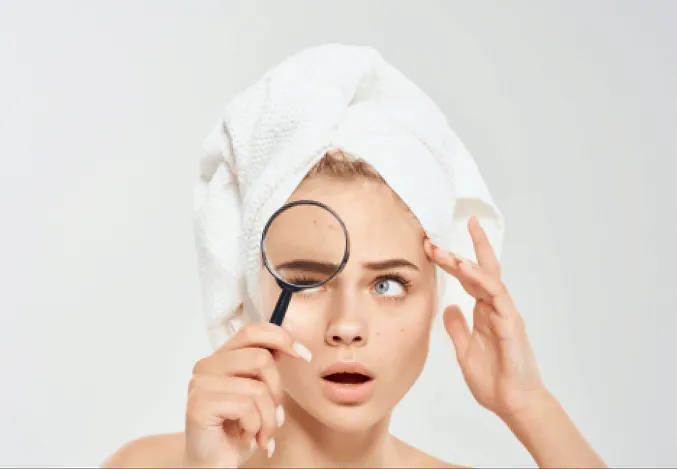Effective Acne Treatments Online
Dealing with acne can be frustrating and affect more than just your skin—it can impact your confidence, too. At Click Pharmacy, we’re here to help you take control. Our range of acne treatments includes everything from prescription creams to oral antibiotics and over-the-counter skincare to support your routine.
Simply complete a short online medical assessment to be reviewed by our UK-registered prescriber. Once approved, your treatment will be delivered discreetly by next-day delivery.

Explore Our Acne Treatment Options
At Click Pharmacy, we offer both prescription-only medications and over-the-counter acne care. Your final treatment will depend on the type and severity of your acne, as well as your medical history.
What is acne?
Acne is one of the most common skin conditions in the UK. It develops when hair follicles become blocked with oil (sebum), dead skin cells, and acne-causing bacteria (Cutibacterium acnes). This leads to inflammation, breakouts, and, in some cases, scarring.
Types of acne include:
- Blackheads and whiteheads: Non-inflamed clogged pores
- Papules and pustules: Red or pus-filled inflamed spots
- Nodules and cysts: Deeper, painful lumps that may scar
Acne most often appears on the face, chest, back, and shoulders.
What causes acne?
Many factors can contribute to acne, including:
Hormonal changes – especially during puberty, periods, or due to conditions like PCOS
Excess oil production and clogged pores
Bacterial buildup
Stress, poor sleep, and diet
Cosmetic and skincare products – especially those that are comedogenic (pore-clogging)
Certain medications – like steroids or lithium
Understanding your triggers is the first step in finding the right solution.
Which treatment is right for me?
The best treatment depends on the type and severity of your acne, your skin sensitivity, and your lifestyle.
Mild acne: Topical retinoids like Differin or OTC cleansers
Moderate acne: Combination creams (e.g., Duac or Epiduo), or antibiotics like Zineryt
Severe acne or cystic breakouts: Oral antibiotics such as Lymecycline or Minocycline
Scarring or post-treatment maintenance: Scar sprays, moisturisers with SPF, and retinol serums
Your treatment will be prescribed based on your assessment by a qualified prescriber.
How effective are acne treatments?
Acne treatments can be highly effective when tailored to your skin type, acne severity, and medical history. They work by targeting one or more of the root causes of acne: excess oil (sebum) production, clogged pores, bacterial growth (especially Cutibacterium acnes, formerly Propionibacterium acnes), and inflammation.
Depending on the treatment, results may include:
Reduced oil production to help prevent new breakouts
Faster skin cell turnover to unclog pores
Antibacterial action to reduce infection and inflammation
Minimized scarring when used early and consistently
Our prescribers consider your skin sensitivity, acne type, age, and lifestyle when recommending a treatment plan. For example, topical gels and creams are ideal for mild to moderate acne, while more persistent or cystic acne may require oral antibiotics or hormonal support.
It's important to understand that acne treatment is not a “quick fix.” Most treatments take 6 to 8 weeks for full effect—though some people begin to notice improvement within 1–2 weeks. If your skin seems worse before it gets better, this may be due to a temporary purge as blocked pores begin to clear.
Always stay consistent with your routine and contact a healthcare professional if irritation continues or worsens.
How long until I see results?
Acne treatments don’t work overnight—but they do work.
OTC cleansers and gels: Improvements often seen in 1–2 weeks
Topical treatments: Noticeable results usually in 4–6 weeks
Oral antibiotics: May take up to 8 weeks for significant improvement
Retinoids: May cause “purging” before clearing begins—this is normal and temporary
Consistency is key. Stick to your routine and be patient with your skin.
Using acne treatments safely
To get the most benefit and avoid side effects:
Use products exactly as prescribed
Apply topicals only to affected areas—usually once or twice a day
Protect your skin with SPF daily
Don’t use multiple treatments together without guidance
Avoid picking or squeezing spots to reduce scarring risk
If you experience irritation, dryness, or other issues, contact our pharmacy team or your GP.
Lifestyle tips to support your skin
While treatments do the heavy lifting, small changes can help:
Wash your face twice daily with a gentle cleanser
Choose non-comedogenic, oil-free skincare
Change pillowcases regularly
Keep long hair clean and away from the face
Drink plenty of water and eat a balanced diet
Try to manage stress—consider mindfulness or sleep hygiene if stress is a trigger
Frequently asked questions
Can acne treatments make skin worse before it gets better?
Yes. Retinoids and benzoyl peroxide can cause initial breakouts—this is called purging and usually settles within 4–6 weeks.
Can I combine oral and topical acne treatments?
Yes, but only under supervision. Combination therapy is often more effective but should be managed by a healthcare provider.
Are acne treatments safe in pregnancy?
Some treatments, especially retinoids, are not suitable. Our prescribers will guide you to safe alternatives.
How do I prevent scarring?
Don’t pick spots, start treatment early, and wear SPF daily. Scar treatments like SilDerm can help fade marks over time.
Related Acne advice & articles
How to order
Order your Acne medication in a few clicks. Ordering from us is easy, fast and discreet.
Free Online Assessment
Answer a few simple questions about your health.
Choose Your Medication
Our prescribers will review and guide you to the right treatment.
Fast Delivery
Once approved, your treatment is dispatched discreet packaging by next day delivery.
